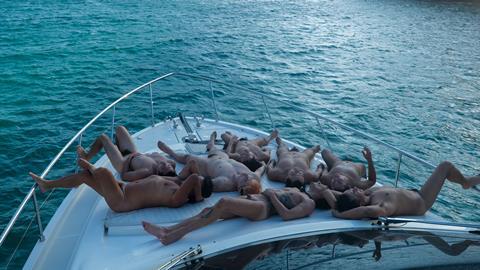
This year, the IFFR Focus sections offer what programmer Olaf Möller describes as the perfect blend.
Half a century after the great auteur Raul Ruiz directed Dialogue d’Exilés in 1974, the Chile in the Heart Focus programme looks at Chilean cinema in exile - that extraordinary wave of movies made by Chileans abroad following the Pinochet coup of 1973.
Meanwhile, also in Focus is the work Antonio and Marco Manetti, the maverick Italian brothers whose musical crime comedies and action flicks are revered in Italy but still not so well known internationally.
The third Focus programme is Scud, the gay Hong Kong-based filmmaker whose 10th and probably final feature, Naked Nations - Tribe Hong Kong has its world premiere during the festival.
As Möller points out, Chile In The Heart pulls together 25 features and shorts made by Chilean directors forced into exile - and is the most ambitious retrospective of this nature ever staged.
“This programme very much is based on my memories,” he says of the films from directors like Miguel Littin, Patricio Guzmán and Antonio Skármeta who were his “early heroes.” As a young cinephile in Germany, he watched their work in Cologne. The city had “a massive Latin American community” and even the most obscure Chilean movies were shown there.
“It was an insane search,” Möller notes of the selection which has been pulled together from prints of movies scattered all over the world, in Canada, Spain, France, Sweden, West Germany, Mexico and elsewhere. These films were often catalogued in a confusing way, in different languages and often with different titles too. He hopes that after Rotterdam the programme will be shown in every country “where Chilean filmmakers went into exile and made films.”
As for Scud, his work is in a very different register to that of the Chilean exiles. He’s an arch provocateur, says Möller.
“We had one of his films already last year which caused a little bit of a ruckus and saw people going at loggerheads with each other,” Möller observes of the director’s 2022 feature, Bodyshop, a camp, sex-filled drama about a queer ghost stalking his past lovers. This year the festival is screening the world premiere of Scud’s Naked Nations - Tribe Hong Kong among a selection of his earlier films.
“Scud, like quite a few other major contemporary filmmakers, is kind of locked in on the gay circuit. His films are usually shown at gay festivals but not at general festivals,” Möller adds. “On the other hand, Scud is certainly one of the most unique and inventive contemporary Hong Kong filmmakers. There is a discrepancy between his artistic achievement and meaning and his exposure, which is based on the subject of his films and his identity.”
Möller points out it is IFFR’s mission, under festival director Vanja Kaludjerci, to break down such barriers. “If we say we are a diverse festival, we meant that on every level. Considering their artistic achievement, they [Scud’s movies] do deserve a wider audience. We also don’t think that gat films are only for gay people. That’s nonsense.”
What is his advice for audiences who don’t know Scud’s work? Is there a good film to start with? “Every film is a good film to start with. You will definitely be dazzled by each and everyone one of them.”
As for the Manetti brothers, Möller insists that they too deserve much more international exposure. “Vanja has been talking about doing the Manettis for quite some time because the Manettis - they are quite something! They are devoted to classical genre cinema which they re-invent. If one would talk about them as [making] elevated genre, they would run amok with hate. No, no. They make straightforward genre movies but they also know that genre is something that constantly re-invents itself. They are unabashedly popular filmmakers.”
The brothers have now completed their Diabolik trilogy based on the Italian comic book character. The Focus includes all three of the films and Möller felt it was a perfect moment to “unieash” the Manettis on Dutch audiences.
“We have very clear thoughts about how we want the festival to be structured,” Möller explains. “A triangle of Scud, the Manetti brothers and Chilean cinema in exile is exactly the balance we are striving for. Each of the three elements is something completely different. They are offering completely different aesthetics and ways of looking at cinema but together they form a very interesting symbolic whole of what cinema can be.”















![[L-R]: Amanda Villavieja, Laia Casanovas, Yasmina Praderas](https://d1nslcd7m2225b.cloudfront.net/Pictures/274x183/6/4/1/1471641_pxl_20251224_103354743_618426_crop.jpg)








![[L-R]: Amanda Villavieja, Laia Casanovas, Yasmina Praderas](https://d1nslcd7m2225b.cloudfront.net/Pictures/100x67/6/4/1/1471641_pxl_20251224_103354743_618426_crop.jpg)
No comments yet